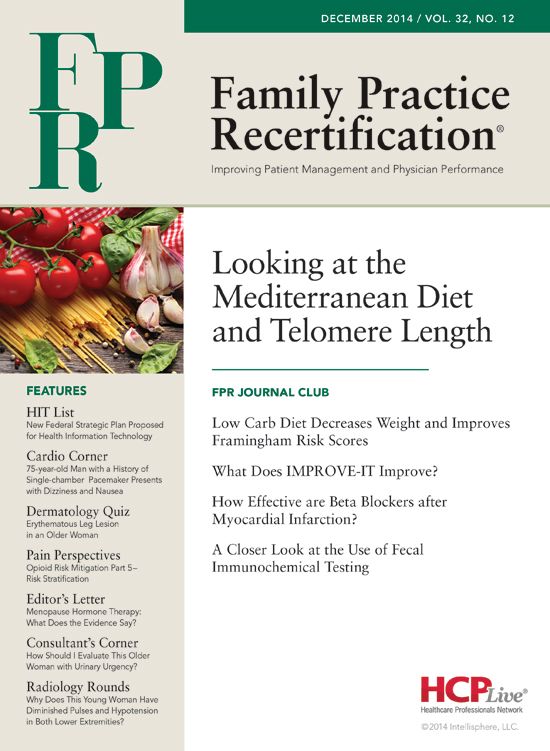Publication
Article
Family Practice Recertification
Looking at the Mediterranean Diet and Telomere Length
Author(s):
This cohort study looked at the influence of maintaining a Mediterranean diet on telomere length, which is commonly used as a surrogate marker for longevity.

Frank J. Domino, MD
Review
“Mediterranean Diet and Telomere Length in Nurses’ Health Study,” BMJ 2014; 349:g6674.
Study Methods:
This study involved participants in the Nurses’ Health Study, a prospective cohort study of 120,000 female nurses ages 30-55 years from 11 U.S. states aged 30-55. Participants took part in biennial questionnaires to update information on demographics, lifestyles, and new diagnoses.
Beginning in early 1980, the study included a semi-quantitative food frequency questionnaire. These items were evaluated using an “alternative Mediterranean diet score,” a measure of diet using the following nine components: vegetable intake (excluding potatoes), fruits, nuts, whole grains, legumes, fish, mono-saturated to saturated fatty acid ratio, red and processed meats, and alcohol intake. The food intake was scored on the range of 0 to 9 with the higher score representing a closer resemblance to a Mediterranean diet than a lower score. Participants were also evaluated for their adherence to dietary patterns.
This dietary information was correlated with DNA data of peripheral leukocyte based genomic analysis. Relative telomere length was determined for participants using well-established protocols.
Results & Outcomes:
The mean age of participants was 59 years with a range of 42-70 years. As a normal part of aging, telomere length shortened as age increased. This telomere data was then compared to the food frequency outcomes. Higher Mediterranean diet scores were associated with higher age- adjusted mean leukocyte telomere lengths. This association remained significant even after inclusion of BMI, pack-years of smoking, physical activity, and total caloric intake. The study went on to adjust for post-menopausal hormone therapy, age of menopause, history of hypertension, socioeconomic status, and again was not confounded by these factors.
Conclusion:
Following a Mediterranean diet (high amounts of fruits, vegetables, vegetable based oils, and a greater intake of fish) compared to a traditional western diet (high red meats and saturated fats and low in fruits and vegetables), led to an increase in telomere length which is often considered a surrogate for life expectancy and longevity.
Discussion:
Discussion:
There is a considerable amount of literature about the effectiveness of following a Mediterranean diet and lifestyle compared to western diets and other interventions to promote longevity. This is a well-done large cohort study of food frequency and found a significant surrogate benefit to Mediterranean diet on life expectancy. The authors estimated that this increase in telomere length correlates to about an additional 4.5 years of life, which is equivalent to the increase in life expectancy a person can have by being a non-smoker compared to a smoker.
What is a Mediterranean diet? It was first described in the 1940s by an American scientist who recognized a benefit from those who live along the southern Italian coast and coastal Greece and the island of Crete. This diet is comprised of primarily plant based foods and seafood. Large amounts of fruits and vegetables are at the core of this dietary pattern with protein derived primarily from fish, then poultry, and the rare use of red meat.
Additionally, small amounts of red wine are also considered part of the Mediterranean diet. This translates into 6-12 servings per day of fruits and vegetables, 4-6 servings per day of whole grain products, 1-3 servings of low fat dairy products per day, 1-2 servings of poultry, fish, or shellfish per day, and one glass of red wine daily.
A Mediterranean diet has been linked with a number of significant health benefits in the past. In 2010 a large meta-analysis demonstrated a lower the risk of coronary artery disease and certain cancers (American Journal of Clinical Nutrition 92(5):1189-96). There is also significant benefit in lowering the risk of type 2 diabetes as well as metabolic syndrome (Journal of the American College of Cardiology 57(11):1299-1313; American Journal of Clinical Nutrition 97(3):505-516). A 2014 meta-analysis demonstrated that following a Mediterranean diet lowered the risk of cancer mortality (International Journal of Cancer 135(8):1884-97).
The western diet is currently primarily made up of far too great a percentage of carbohydrates (typically from highly processed foods—including corn sweeteners). Fats are often saturated and obtained not from what we make at home, but rather from sources outside the home. To address the US population’s health issues a simple solution is to increase our fruits and vegetables, limit our red meat intake, and increase our exercise.
Will the Mediterranean diet’s influence on telomere length result in longevity benefit for your patients? While only a correlation, it comes with an exhaustive degree of the medical literature that supports this notion. This DNA finding is one more reason to believe how we are eating and what we do with regard to exercise has the single greatest influence on our long term health. Encourage patients to increase their fruit and vegetable intake and limit their red meat intake, and take a nice walk. This will help them lose weight, prevent diabetes and cancer, and likely live longer.
About the Author
Frank J. Domino, MD, is Professor and Pre-Doctoral Education Director for the Department of Family Medicine and Community Health at the University of Massachusetts Medical School in Worcester, MA. Domino is Editor-in-Chief of the 5-Minute Clinical Consult series (Lippincott Williams & Wilkins).
Additionally, he is Co-Author and Editor of the Epocrates LAB database, and author and editor to the MedPearls smartphone app. He presents nationally for the American Academy of Family Medicine and serves as the Family Physician Representative to the Harvard Medical School’s Continuing Education Committee.





